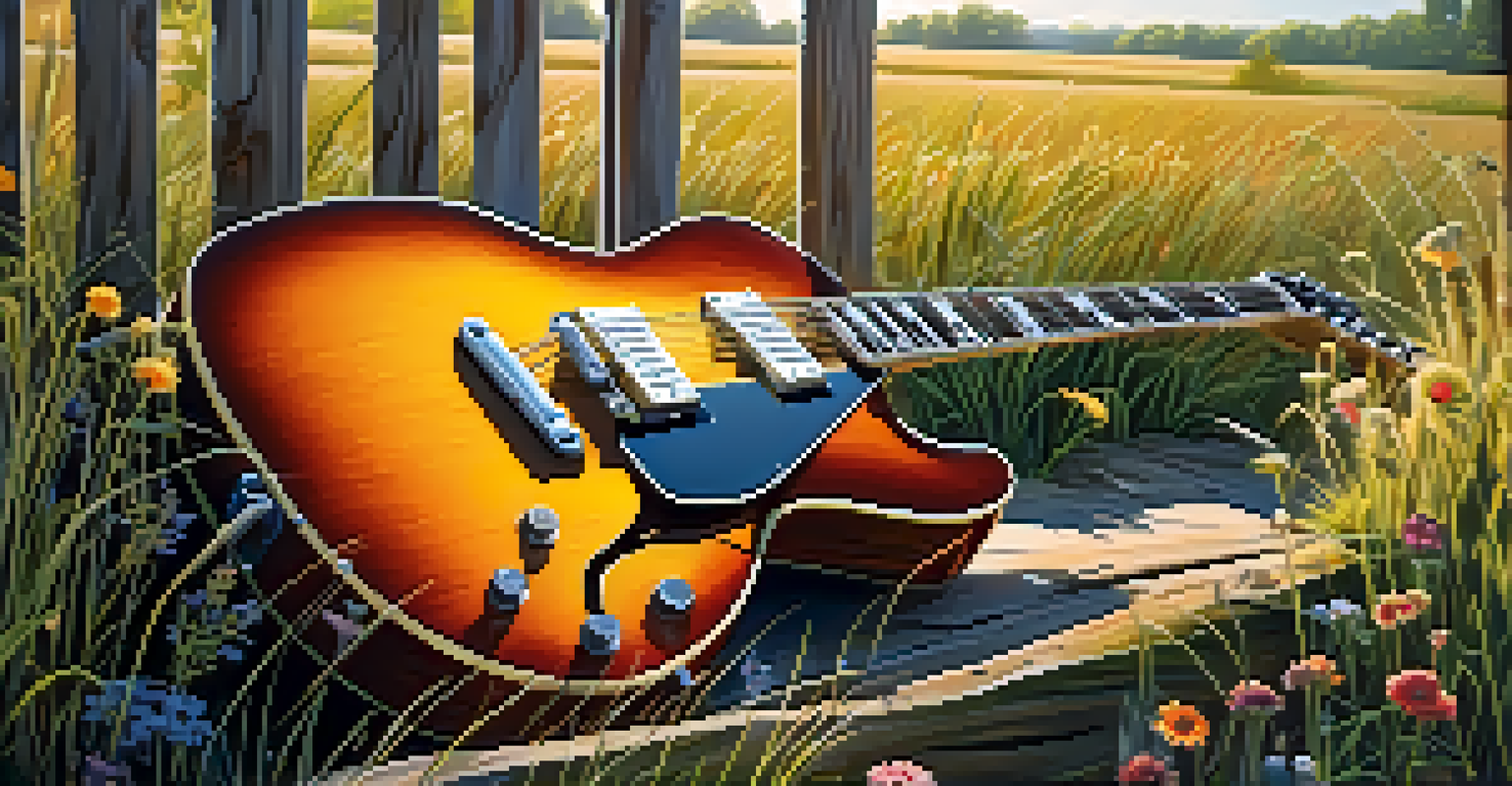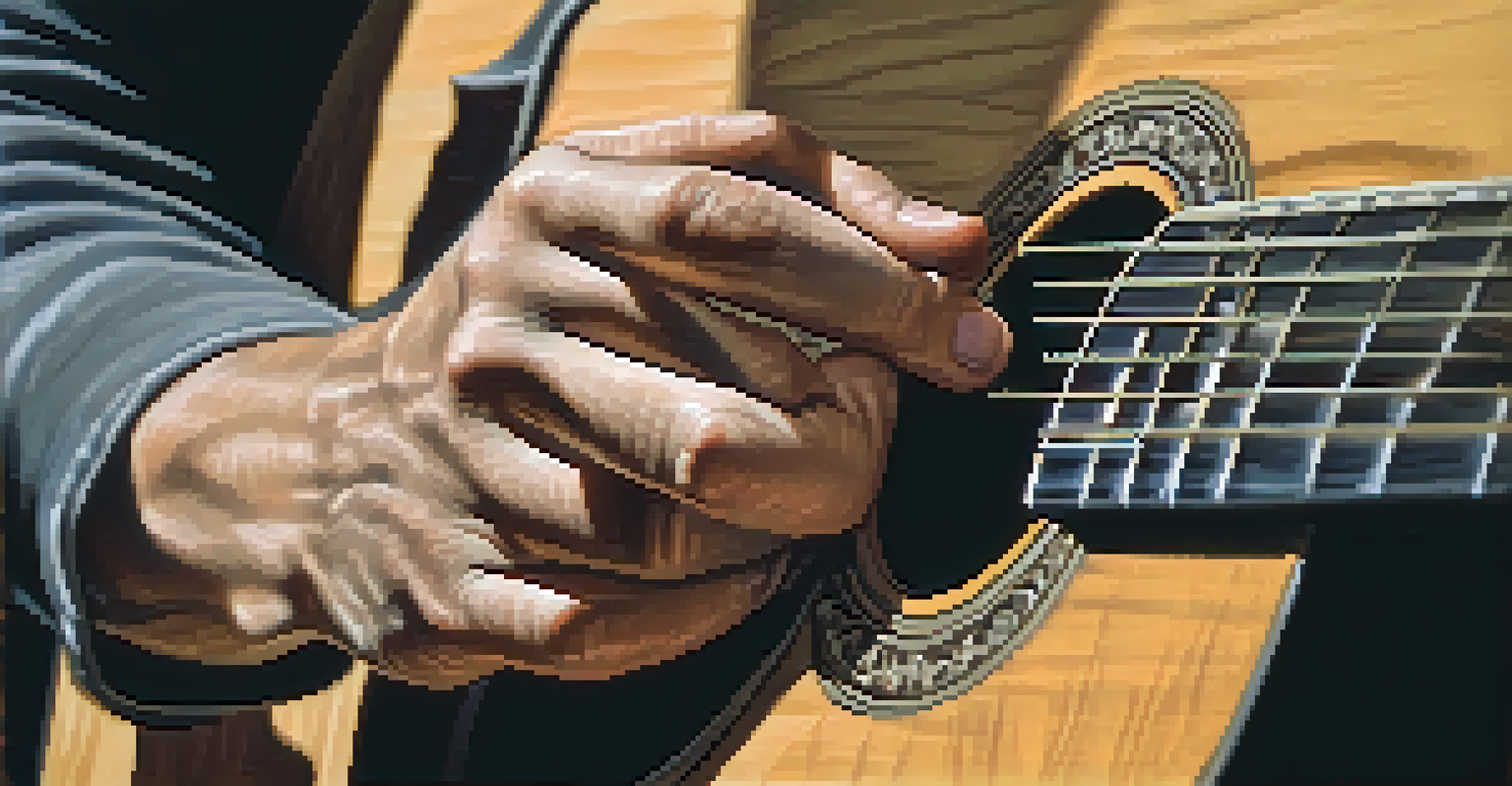Country Music's Evolution: The Role of the Guitar

The Roots of Country Music and Early Guitar Influence
Country music has deep roots in American folk traditions, with influences from various cultures, including African American, Irish, and Spanish music. Early musicians often used simple string instruments, including the guitar, to create melodies that resonated with the struggles and stories of everyday life. This laid the groundwork for a genre that would express the heart and soul of rural America.
Country music is about storytelling, and the guitar has always been the voice that tells those stories.
In its infancy, the guitar was primarily an accompanying instrument, providing a rhythmic backbone to songs sung around campfires and in small gatherings. As country music began to take shape, the guitar's role evolved from a mere support tool to a vital element of storytelling. Songs often featured personal narratives, and the guitar helped convey these tales with emotion and depth.
The melding of different musical styles during the early 20th century paved the way for the guitar to become central to country music. As artists experimented with their sound, the guitar transformed from a folk instrument into a dominant force, allowing musicians to explore new lyrical themes and sounds.
The Rise of the Acoustic Guitar in Country Music
During the 1920s and 1930s, the acoustic guitar gained prominence in country music, largely due to its portability and versatility. Artists like Jimmie Rodgers and the Carter Family showcased the acoustic guitar's ability to deliver heartfelt performances, making it a staple at live shows and radio broadcasts. This era solidified the guitar as a symbol of authenticity and connection in the genre.

The acoustic guitar allows for a range of playing styles, from fingerpicking to flatpicking, each adding a unique flavor to the music. This adaptability enabled artists to express a wide array of emotions, from joy to sorrow, and contributed to the storytelling aspect that country music is celebrated for. It became a canvas upon which musicians painted their life experiences.
Guitar's Evolution in Country Music
The guitar has transitioned from a simple accompanying instrument to a central element that shapes the storytelling aspect of country music.
As country music grew in popularity, the acoustic guitar's sound resonated with audiences looking for genuine and relatable music. The instrument's warm tones and rhythmic strumming became synonymous with the genre, helping to establish a sound that would influence countless artists and subgenres in the years to come.
Electric Guitar: A Game Changer for Country Music
The introduction of the electric guitar in the 1940s marked a pivotal moment in country music's evolution. Artists like Hank Williams and later, Elvis Presley, began to incorporate electric guitars into their sound, leading to a new subgenre called honky-tonk. This shift brought a more vibrant, energetic sound that appealed to a wider audience and changed the landscape of country music forever.
The guitar is a bridge between the past and the future of country music, shaping its sound and connecting generations.
With the electric guitar, musicians could experiment with volume and effects, adding depth and richness to their music. This opened the door for innovative guitar solos and distinctive riffs, allowing artists to showcase their technical skills and creativity. The electric guitar became a tool for self-expression, enabling artists to push the boundaries of traditional country music.
As the electric guitar gained traction, it also led to the development of various subgenres, including country rock and outlaw country. Influential bands like The Byrds and artists like Willie Nelson embraced this new sound, blending elements of rock and country. This fusion not only expanded the audience for country music but also solidified the guitar's role as a central instrument across genres.
The Influence of Guitar Techniques on Country Music Styles
Different guitar techniques have significantly influenced the evolution of country music styles. Techniques such as fingerpicking and slide guitar have been instrumental in creating the genre's distinctive sound. Artists like Merle Haggard and Chet Atkins mastered these techniques, showcasing how skillful playing can elevate a song's emotional impact.
Fingerpicking, in particular, adds a unique texture to country music, allowing for intricate melodies and harmonies. This technique became a hallmark of the genre, with many artists adopting it to create their signature sound. The expressive nature of fingerpicking has helped musicians convey their stories in a deeply personal and relatable way.
Influence of Iconic Guitarists
Legendary guitarists have significantly impacted country music, showcasing the instrument's potential for emotional expression and innovation.
Slide guitar, on the other hand, brings a soulful quality to country music, often evoking feelings of longing and nostalgia. Popularized by artists such as Jerry Douglas and Derek Trucks, this technique has enriched the genre by adding an element of blues, further demonstrating the guitar's versatility and its ability to transcend musical boundaries.
Iconic Guitarists Who Shaped Country Music
Throughout country music history, several iconic guitarists have left an indelible mark on the genre. Artists like Johnny Cash and Buck Owens utilized their guitar skills to craft memorable songs that became anthems for generations. Their influence not only shaped the sound of country music but also inspired countless aspiring musicians to pick up the guitar.
Another notable guitarist is Brad Paisley, known for his virtuosic playing and innovative use of technology in his performances. He has successfully blended traditional country sounds with modern influences, proving that the guitar can continuously evolve within the genre. His creativity demonstrates how the instrument can adapt to changing musical landscapes while still honoring its roots.
Similarly, guitarists like Vince Gill and Albert Lee have made significant contributions to country music through their exceptional skills and songwriting abilities. Each of these musicians has showcased the guitar's potential, not just as an accompanying instrument but as a lead voice that can tell stories, evoke emotions, and connect with audiences on a deeper level.
The Guitar's Role in Modern Country Music
Today, the guitar remains a central element in modern country music, adapting to new styles and trends. Contemporary artists often blend traditional country sounds with pop and rock influences, creating a fresh and exciting sound. The guitar is at the forefront of this evolution, allowing musicians to explore innovative techniques and songwriting approaches.
As technology advances, musicians are now able to experiment with various effects and tunings, pushing the boundaries of what is possible with the guitar. This has led to the emergence of subgenres like bro-country and Americana, each showcasing the guitar's versatility and its ability to connect with diverse audiences. The instrument continues to be a tool for artistic expression and creativity.
Future of Country and the Guitar
As country music continues to evolve, the guitar remains a vital tool for artistic expression, connecting new generations of musicians and audiences.
Moreover, the guitar's accessibility has empowered a new generation of musicians. With resources like online tutorials and social media platforms, aspiring guitarists can learn, share their music, and connect with others around the world. This has fostered a vibrant community of creators who are passionate about country music and the guitar's role within it.
The Future of Country Music and the Guitar
As we look to the future, the guitar will undoubtedly continue to play a crucial role in the evolution of country music. With the genre's ever-expanding boundaries, we can expect to see new styles and influences emerge, further enriching the musical landscape. The guitar will remain at the heart of this transformation, offering endless possibilities for innovation and creativity.
Emerging artists are already experimenting with unique sounds and styles, blending elements from various genres. This fusion not only keeps the music fresh and exciting but also introduces the guitar to new audiences who may not have previously engaged with country music. The instrument's adaptability ensures that it will remain relevant in the evolving musical scene.

Ultimately, the guitar is more than just an instrument in country music; it is a symbol of the genre's spirit and resilience. As artists continue to share their stories through the music, the guitar will be there, bridging generations and connecting people through the universal language of song.